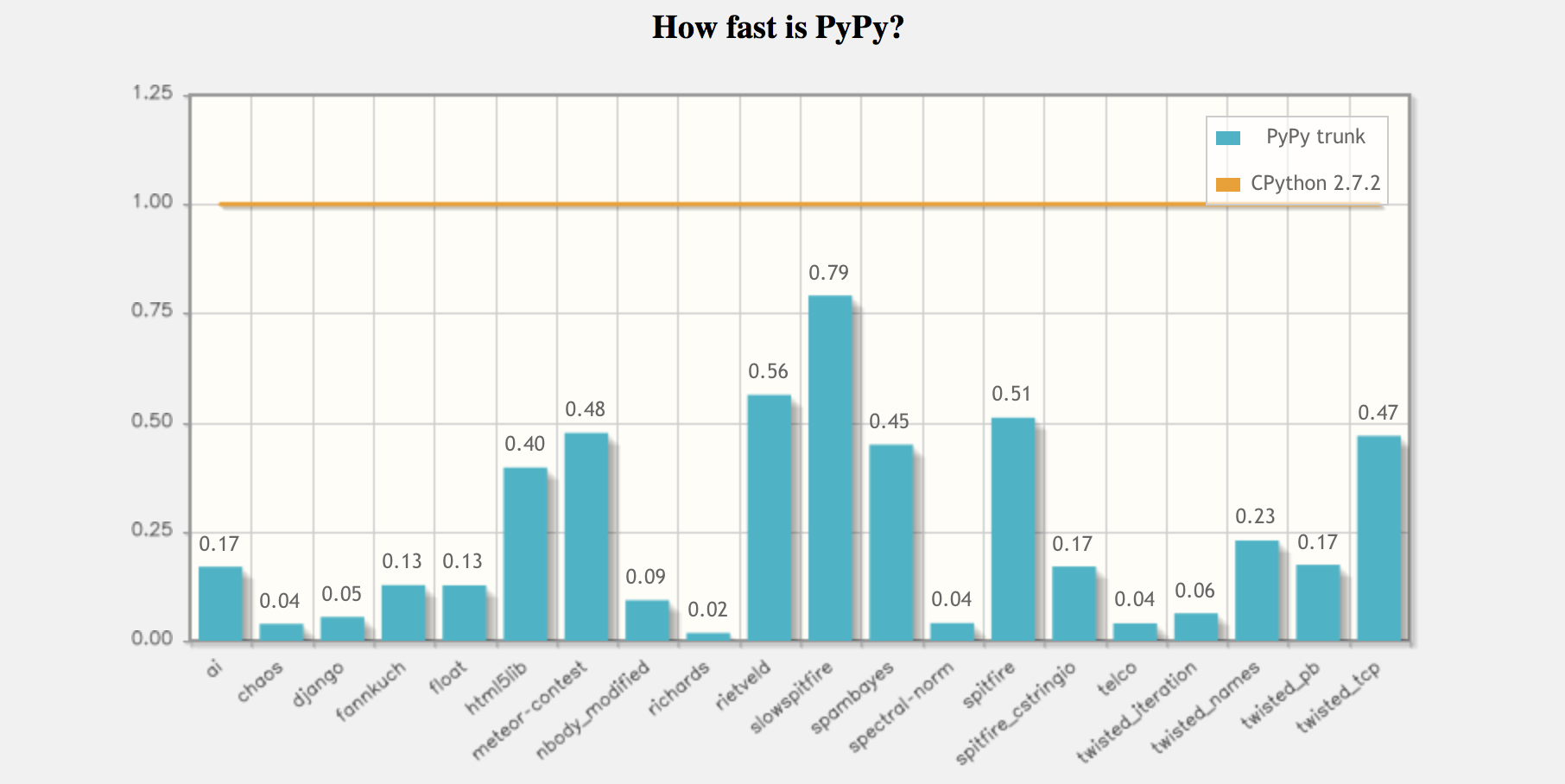PyPy and RPython
DesertPy
22 October 2014
Tim Hochberg
This talk with involve a brief discussion of PyPy, a Python interpreter implemented in Python, followed by a longer discussion of the RPython toolchain which makes this implementation not only possible, but faster than the standard C-Python interpreter. The discussion of RPython will be illustrated using a simple interpreter implemented in Python, which is then translated to native code using the RPython toolchain.
Also, there will be Mandelbrot sets.
What is PyPy
- An implementation of Python written in Python because...
- Python allows easier experimentation with new features and approaches
- Stackless (microthreads)
- Sandboxing
- Software Transactional Memory
- ...
- Also, over 6× faster than CPython on average!

What's the Catch?
- PyPy relies on a JIT for speed; not effective for all code.
- The quoted speedups are based on benchmarks. YMMV.
- However, everything I timed was faster using PyPy.
- Not all modules based on C (or other languages) are working.
- There is a list of compatible modules at bitbucket.org/pypy/compatibility
- Notably, NumPy only partially working. Also, slow.
PyPy Example
# mandelbrot.py
def iterate_z(re0, im0, re, im, n):
for i in range(n):
# Z = Z**2 + Z0
temp = re*re - im*im + re0
im = 2*re*im + im0
re = temp
if hypot(re, im) > r_max:
return i
return n
def grey_value(re, im):
return int(scale * iterate_z(re, im, 0, 0, n))
def pixel(i, j):
return grey_value((x_offset + pixel_size * i), (y_offset + pixel_size * j))
def generate_pgm():
write("P2\n")
write("%s\n" % i_max)
write("%s\n" % j_max)
write("%s\n" % colour_max)
for j in range(j_max):
for i in range(i_max):
write("%s\n" % pixel(i,j))
# Setup code and boilerplate stuff
# ....
Timing
- Python 2.7.7: 15.4 seconds
- PyPy 2.3.1 (Python 2.7.6) : 3.0 seconds

5x Faster
- In line with benchmarks.
How is this possible?
PyPy (Python) ➡ [Magic Translator] ➡ PyPy (native code with JIT added automagically)
- If it's possible to translate Python to fast native code, why not always do it?
- PyPy is really written in RPython
- RPython is a subset of Python
- Hints are added to help the the translator
PyPy (RPython with hints) ➡ [RPython Toolchain] ➡ PyPy (native code with JIT)
RPython
- Whole programs; not modules
- Not fully documented
- The exact definition is “RPython is everything that our translation toolchain can accept”
- Many of the dynamic features of Python unavailable after module execution
def works():
a = "five"
b = "ten"
c1 = a + b
a = 5
b = 10
c2 = a + b
return c1, c2
def fails(a, b):
return a + b
works()
fails("five", "ten")
fails(5, 10)
<pre>
[translation:info] Error:
[...about 50 lines of traceback...]
[translation:ERROR] UnionError:
[translation:ERROR]
[translation:ERROR] Offending annotations:
[translation:ERROR] SomeString(const='five', no_nul=True)
[translation:ERROR] SomeInteger(const=5, knowntype=int, nonneg=True,unsigned=False)
[translation:ERROR]
[translation:ERROR]
[translation:ERROR] Occurred processing the following simple_call:
[translation:ERROR] (KeyError getting at the binding!)
[translation:ERROR] v0 = simple_call((function fails), (5), (10))
[translation:ERROR]
[translation:ERROR] In <FunctionGraph of (mandelbrot:91)main at 0x108091088>:
[translation:ERROR] Happened at file mandelbrot.py line 96
[translation:ERROR]
[translation:ERROR] c1, c2 = works()
[translation:ERROR] write(c1)
[translation:ERROR] write(str(c2))
[translation:ERROR] c1 = fails("five", "ten")
[translation:ERROR] ==> c2 = fails(5, 10)
[translation:ERROR] write(c1)
[translation:ERROR] write(str(c2))
[translation:ERROR] generate_pgm()
[translation:ERROR]
[translation:ERROR] Known variable annotations:
[translation:ERROR]
[translation:ERROR] Processing block:
[translation:ERROR] block@6 is a <class 'rpython.flowspace.flowcontext.EggBlock'>
[translation:ERROR] in (mandelbrot:91)main
[translation:ERROR] containing the following operations:
[translation:ERROR] v2 = getitem(v1, (0))
[translation:ERROR] v3 = getitem(v1, (1))
[translation:ERROR] v4 = simple_call((function write), v2)
[translation:ERROR] v5 = str(v3)
[translation:ERROR] v6 = simple_call((function write), v5)
[translation:ERROR] v7 = simple_call((function fails), ('five'), ('ten'))
[translation:ERROR] v0 = simple_call((function fails), (5), (10))
[translation:ERROR] v8 = simple_call((function write), v7)
[translation:ERROR] v9 = str(v0)
[translation:ERROR] v10 = simple_call((function write), v9)
[translation:ERROR] v11 = simple_call((function generate_pgm))
[translation:ERROR] --end--
</pre>
Interpreter Example
- First attempt was a basic lisp-like interpreter based on Peter Norvig's lis.py
- Only partially successful
- Second attempt operated on an assembly-like language.
- Uglier
- More successful as an experiment
(Ugly) Interpreter Example
- Portion of assembly language program for generating the Madelbrot set
Equivalent to earlier iterate_z function
label iterate_z # for k in range(n): set k 0 set re 0.0 set im 0.0 label k_loop # temp = re*re - im*im + re0 exec temp mul re re exec temp1 mul im im exec temp sub temp temp1 exec temp add temp re0 # im = 2*re*im + im0 exec im mul 2.0 im exec im mul im re exec im add im im0 # re = temp set re temp # if hypot(re, im) > r_max: exec mag hypot re im exec flag gt mag r_max branchif flag return_from_iterate # end of loop exec k add k 1 exec flag lt k n branchif flag k_loop # return n set k n jump return_from_iterate
Main Loop
def execute(program):
code, mem = compile(program)
pc = 0
try:
while pc < len(program):
jitdriver.jit_merge_point(pc=pc, mem=mem, code=code, program=program)
op = opcode(code, pc)
if op == C_SET:
a = opcode(code, pc+1)
b = opcode(code, pc+2)
mem[a] = mem[b]
pc += 3
elif op == C_EXEC_1:
symbol = opcode(code, pc+1)
op = opcode(code, pc+2)
a = mem[opcode(code, pc+3)]
try:
mem[symbol] = monops[op](a)
except KeyError:
raise ValueError("illegal unary op: %s" % op)
pc += 4
elif op == C_EXEC_2:
symbol = opcode(code, pc+1)
op = opcode(code, pc+2)
a = mem[opcode(code, pc+3)]
b = mem[opcode(code, pc+4)]
try:
mem[symbol] = binops[op](a, b)
except KeyError:
raise ValueError("illegal binary op: %s" % op)
pc += 5
elif op == C_BRANCHIF:
x = opcode(code, pc+1)
loc = opcode(code, pc+2)
if int_value(mem[x]):
pc = loc
else:
pc += 3
elif op == C_JUMP:
loc = opcode(code, pc+1)
pc = loc
elif op == C_DISPLAY:
arg = opcode(code, pc+1)
os.write(stdout_fd, '%s\n' % mem[arg].as_text())
pc += 2
elif op == C_END:
pc = len(code)
else:
raise ValueError("unknown command")
return 0
except:
os.write(stderr_fd, "ERROR at PC: %s\n" % pc)
return 1
How Does This Perform With Python?
$ time python machine.py mandelbrot.mach > img.pgm
jeopardy theme
real 91m46.877suser 26m4.570ssys 0m3.152s
Over 350 times worse than our original Python program!
How Does This Perform With PyPy?
$ time pypy machine.py mandelbrot.mach > img.pgm
real 2m33.314suser 2m29.942ssys 0m2.939s
Now only 10 times worse than our original program
Translating using RPython
$ pypy rpython machine.py
Forty seconds and many messages to stdout later we have an executable machine-c.
$ time ./machine-c mandelbrot.mach > img.pgm
real 0m6.137suser 0m4.528ssys 0m1.605s
Suddenly our simple interpreter is running faster than CPython!
Adding a JIT
This involves about 5 lines of hints and boilerplate and passing the --opt==jit option to RPython.
jitdriver = JitDriver(greens=['pc', 'code', 'program'], reds=['mem'])
def jitpolicy(driver):
from rpython.jit.codewriter.policy import JitPolicy
return JitPolicy()
# And, at the top of the event loop (we've seen this before)
jitdriver.jit_merge_point(pc=pc, mem=mem, code=code, program=program)
$ pypy rpython --opt=jit machine.py
Four minutes and many, many messages later we have a new machine-c executable.
JIT Improvement
$ time ./machine-c mandelbrot.mach > img.pgm
real 0m3.155suser 0m1.561ssys 0m1.589s
- Another factor of two improvement:
- almost as fast as
mandelbrot.pyrunning on PyPy - 5× faster than
mandelbrot.pyrunning on CPython - 160× faster than
mandelbrot.machrunning onmachine.pyrunning on PyPy - 1700× faster than
mandelbrot.machonmachine.pyrunning on CPython
Speed Summary
| mandelbrot.py | machine.py | skeem.py | |
|---|---|---|---|
| Python 2.7 | 15.4 | 5506 | 45095 |
| PyPy | 3.0 | 153 | 532 |
| RPython | 2.3 | 6.1 | 98 |
| RPython JIT | – | 3.2 | 504 |
Conclusion
- PyPy
- Fast
- Missing some modules
- RPython
- Harder than writing a interpreter in Python.
- Much easier than writing a fast interpreter in Python (or any other language that I know of).
- Might also be useful for writing some standalone applications.
Thanks
Tim Hochberg
tim@bitsofbits.com
Links
- http://pypy.org/ – main pypy site.
- http://speed.pypy.org/ – pypy benchmarks.
- http://rpython.readthedocs.org/ –
- http://morepypy.blogspot.com/2011/04/tutorial-writing-interpreter-with-pypy.html – writing a BF interpreter with PyPy
- http://bitly.com/bundles/cfbolz/1/ – series of posts on pypy based interpreters
- https://bitbucket.org/pypy/compatibility/wiki/Home – Wiki of known compatible and incompatible extension modules
- http://www.bitsofbits.com/2014/09/28/numpy-on-pypy-with-a-side-of-psymeric/ – Some of experiments by me with NumPy on PyPy
- http://www.bitsofbits.com/2014/10/22/a-partially-successful-adventure-in-rpython/ – A bit about skeem.py
- https://github.com/bitsofbits/rpython-experiments – Code for this talk